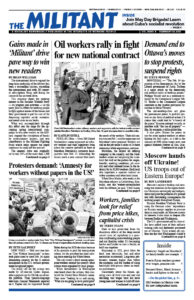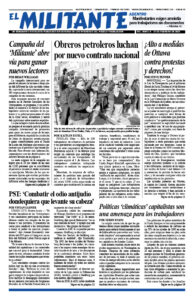March 3, 1997
The first American Airlines pilots’ strike since 1959 lasted only four minutes before President William Clinton intervened to stop the strike under the Railway Labor Act. The 9,300 members of the Allied Pilots Association had struck February 15.
The administration invoked the Railway Labor Act by citing a threat to the nation’s commerce, and grave inconvenience to travelers. The act was signed in 1926 by President Calvin Coolidge and amended to include workers in the airline industry in 1934. Its purpose is to string out negotiations, tie up workers with restrictive regulations, and to sap the strength of the workers’ fight.
Many airline workers and others saw the political impact that the strike could have had as the main reason for the intervention. “We’re behind the pilots 100 percent,” said Cruz Lopez, a ramp worker at American.
March 3, 1972
The spectacle that is being played in Peking before international television coverage involves the top political leadership of two of the three major world powers. Meanwhile, U.S. bombers carry out the heaviest air attacks on Indochina since 1968.
The detente that President Nixon and the other chief political agents of U.S. imperialism is seeking to formalize with the Peking bureaucracy is aimed at stabilizing imperialist rule in Southeast Asia by utilizing Peking’s policy of “peaceful coexistence.”
Nixon “hopes to win by talking in Peking what he has failed to win by fighting on the battlefield,” stated Hoang Tung, editor of the official Hanoi newspaper Nhan Dan. “While Nixon gets his 21-gun salute in Peking, we’ll be giving him a different kind of salute in South Vietnam. There will be more than 21 guns. And they won’t be firing blanks.”
March 1, 1947
LONDON — Great Britain received a rude awakening when a fuel shortage led to a factory shutdown affecting millions of workers on Feb. 10. All over the country “vigilance committees” are being set up to organize the fight against the employers during the emergency.
The shop stewards committee of the Standard Telephones and Cables factory calls for creation of area committees composed of representatives from trade unions, shop steward committees, trades councils and local Labor Parties, which would in cooperation with the Regional Fuel Boards, “direct the allocation, distribution and conservation of fuel.”
It urges also that “should full employment in a particular industry or section of industry be impossible, a sliding scale of hours be devised by the Workers’ Committee concerned to meet the particular situation” in dividing the work.

